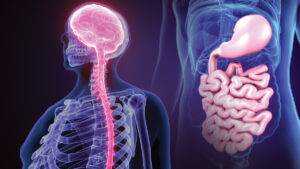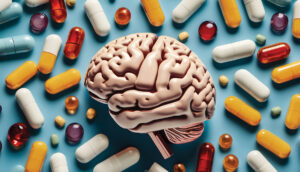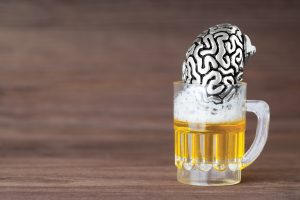In writing an article on brain nutrients, the choices of potential nutraceuticals for inclusion are almost endless. A partial list includes (in alphabetical order) acetyl-L-carnitine, alpha-GPC, Bacopa monnieri, citicoline, DHA, DMAE, Ginkgo biloba, gotu kola, huperzine A, L-glutamine, phosphatidylcholine, phosphatidylserine, vinpocetine, vitamin B12 and others. So, how to choose which of them to write about? In order to do justice to the topic, I decided to write about one amino acid, one herb and one vitamin. In this case, phosphatidylserine, ginkgo biloba and vitamin B12.
Phosphatidylserine
The phospholipid phosphatidylserine (PS) is active at cell membranes (including synaptic membrane zones) and is a major building block for nerve cells. A significant amount of published clinical research has demonstrated that PS supplementation supports various cognitive parameters.1
An example is a double-blind, randomized, controlled study2 to investigate the effects of PS on the cognitive functions of elderly Japanese subjects with memory complaints. Seventy-eight elderly people with mild cognitive impairment (50-69 years old) were randomly assigned to take PS (100 mg or 300 mg/day) or placebo for six months. In the subjects with a relatively low score at baseline, the memory scores in the PS-treated groups were significantly increased compared to the baseline, while those of the placebo group remained unchanged. The memory improvements in the PS-treated groups were mostly attributed to the increase in delayed verbal recall, a memory ability attenuated in the earliest stage of dementia.
Another double-blind, placebo controlled study3 assessed the influence of PS on memory and mood in patients aged 60-80 years, and who reported some memory difficulties that were verified by a score of at least 25 out of 30 on the Mini Mental State Test, which screens for cognitive impairment. Seventy-two subjects, randomly assigned to placebo and therapy groups, were treated for three months with 300 mg, PS daily. Results showed a large and statistically significant positive influence of treatment on both memory and mood, whereas influence of placebo was small and non-significant. Components of memory and cognition that were most improved by the treatment included memorizing information, visual memory, and memorizing numbers. Mood was also influenced. Winter mood changes (“winter blues”) did develop in the placebo group but were entirely blocked in those treated with PS.
A 12-week, placebo-controlled clinical trial4 conducted on 50 patients (mean age of 60.5, 52 percent female) with age-related cognitive decline examined the effects of 300 mg of soy derived PS daily. Learning and memory were assessed at three, six, nine and 12 weeks using a clinically relevant computerized neuropsychological test battery. Comparisons with PS and placebo are shown below.
Other controlled trials were also conducted on PS. In each case, the results showed significant improvements in cognitive performance over placebo in patients with cognitive performance issues (300 mg/day),5 Alzheimer’s (300- 700 mg/day)6-8, and senile dementia (300 mg/day).9 In addition, research with PS supplementation has also shown improvements in cognitive function in both patients with mild cognitive impairment10 and mild dementia.11
In laboratory tests on serum samples of patients treated with PS, significant reductions in uric acid and SGPT levels were noted (which may be considered beneficial), and all other serum parameters were unaffected.12 In addition, PS has a favorable benefit-to-risk profile since, according to researchers, “its benefits are often remarkable, adverse effects from its use are virtually never seen, and its compatibility with most common drugs is established.”13 Most of the research on PS in the treatment of dementias and cognitive dysfunctions indicated an effective daily dosage range of 300-400 mg.14
Ginkgo biloba Extract
The research on Ginkgo biloba extract in treating dementias and other cognitive functions is vast. As a matter of fact, there are hundreds of published clinical studies on ginkgo.15 Consequently, with the exception of a discussion on one clinical trial, it was necessary to limit my presentation of the data to reviews and meta-analyses on the topic. It should be noted that ginkgo is used as a standardized preparation containing 24 percent ginkgo flavonoid glycosides and six percent terpene lactones, in a typical range of 120-240 mg daily, taken in two to three doses.16
To begin with, eight randomized, double-blind, placebo-controlled studies on ginkgo extract were systematically reviewed.17,18 The reviewers concluded that that ginkgo had modest effects on improving the symptoms of dementia and cerebral insufficiency. Furthermore, they indicated that the improvement was equivalent to therapy with ergoloid mesylates (hydergine).
A meta-analysis19 included four studies (with a total of 212 subjects in the placebo and ginkgo groups) that met inclusion criteria for adequate clinical design for examining ginkgo’s effects on objective measures of cognitive function in patients with Alzheimer’s disease. The results were that a significant overall effect in the gingko groups was demonstrated that was comparable with the benefits of donepezil (Aricept). Likewise, a review20 of studies on ginkgo that lasted at least six months in duration concluded that ginkgo extract was equally effective in mild to moderate Alzheimer’s dementia in comparison to second-generation cholinesterase inhibitors. Other research reviews on the use of ginkgo in treating dementia have shown similar beneficial results to those previously discussed.21
In a controlled trial of ginkgo extract, LeBars et al. (1997) treated 309 patients with mild to moderately severe forms of dementia of the Alzheimer type (DAT) or multi-infarct dementia (MID), using 120 mg/day or placebo. The evaluation of patients took place periodically, up through 52 weeks of therapy. The results indicated that ginkgo extract was capable of stabilizing cognitive performance and social functioning in patients with dementia. These changes were objectively quantifiable and noticeable by caregivers, despite the fact that they were classified as modest.
Vitamin B12
Vitamin B12 deficiency is frequently associated with neurological problems, including memory loss and dementia.22 Individuals with Alzheimer’s disease often have low levels of vitamin B12 in the blood and/or low cerebrospinal fluid.23 In fact, vitamin B12 deficiency affects 10-15 percent of adults over the age of 60.24 According to some researchers, many cases of Alzheimer’s dementia are actually missed B12 deficiency cases, and repletion of the vitamin has positive results regardless of other risk factors.25 In one clinician’s experience, replenishment of vitamin B12 can reverse 75 percent of B12 deficiency dementias when discovered early enough.26 Other research also suggests that dementia caused by vitamin B12 deficiency can be reversed by vitamin treatment, but reversibility seems to be dependent upon the duration of the associated neurologic complications.27
In an initial, randomized, controlled study28 on elderly subjects with increased dementia risk (mild cognitive impairment), researchers showed that treatment with 500 mcg vitamin B12, combined with 800 mcg folic and 20 mg vitamin B6, slowed shrinkage of the whole brain volume by 50 percent over two years. In a follow up study29, the same researchers found that the vitamin B12 combination reduced, by as much as seven fold, the cerebral atrophy in those gray matter (GM) regions specifically vulnerable to the Alzheimer’s disease process, including the medial temporal lobe.
A note on vitamin B12 absorption: The intestinal absorption of B12 is dependent upon its binding with the glycoprotein intrinsic factor (IF), secreted from the parietal cells of the stomach. If the gastric juices of a person lacks IF, then there is little uptake of the vitamin (as little as one percent).30 This issue can be addressed through the use of a vitamin B12 lozenge, which can be absorbed via the sublingual plexus and buccal cavity, thereby bypassing the issue with IF entirely. The result is a 90 percent increase in serum B12.31
Conclusion
Although there are many nutraceuticals that support brain health, PS, ginkgo and B12 are three very good ones with a history of safe and effective use.
References:
1 Kidd PM. A review of nutrients and botanicals in the integrative management of cognitive dysfunction. Altern Med Rev. 1999;4(3):144-61.
2 Kato-Kataoka A, Sakai M, Ebina R, Nonaka C, Asano T, Miyamori T. Soybean-Derived Phosphatidylserine Improves Memory Function of the Elderly Japanese Subjects with Memory Complaints. J Clin Biochem Nutr. 2010;47:246–255.
3 Gindin J, Novikov M, Dedar D, Walter- Ginzburg A, Naor S, Levi S. The effect of plant phosphatidylserine on age-associated memory impairment and mood in the functioning elderly. The Geriatric Institute for Education and Research, and Department of Geriatrics, Kaplan Hospital, Rehovot, Israel. Unpublished report; 2009.
4 Crook TH. Treatment of Age-Related Cognitive Decline: Effects of Phosphatidylserine. In Klatz RM (ed). Anti-Aging Medical Therapeutics, Vol II. Chicago: Health Anti-Aging Medical Therapeutics, Vol II. Chicago: Health Quest Publications; 1998:20-29.
5 Cenacchi T, Bertoldin T, Farina C, Fiori MG, Crepaldi G, et al. Cognitive decline in the elderly: A double-blind, placebo-controlled multicenter study on efficacy of phosphatidyiserine administration. Aging Clin Exp Res. 1993;5:123-133.
6 Engel RR, Satzger W, Gunther W, Kathmann N, Bove D, Gerke S, Munch U, Hippius H. Double-blind cross-over study of phosphatidylserine vs. placebo in patients with early dementia of the Alzheimer type. European Neuropsychopharmacology. 1992;2(2):149-55.
7 Funfgeld EW, Baggen M, Nedwidek P, Richstein B, Mistlberger G. Double-blind study with phosphatidylserine (PS) in parkinsonian patients with senile dementia of Alzheimer’s type (SDAT). Progress in Clinical and Biological Research. 1989;317:1235-46.
8 Rabboni M, Maggioni FS, Giannelli A, Beinat L. Neuroendocrine and behavioural effects of phosphatidylserine in elderly patients with abiotrophic or vascular dementia or mild depression. A preliminary trial. Clin Trials J. 1990;27(3):230-240.
9 Delwaide PJ, Gyselynck-Mambourg AM, Hurlet A, Ylieff M. Double-blind randomized controlled study of phosphatidylserine in senile demented patients. Acta Neurologica Scandinavica. 1986;73(2):136-40.
10 Sinforiani E, Agostinis C, Merlo P, Gualteri S, Mauri M, Mancuso A. Cognitive decline in ageing brain. Therapeutic approach with phosphatidylserine. Clin Trials J. 1987; 24(1):115-124.
11 Puca FM, Savarese MA, Minervini MG. Exploratory trial of phosphatidylserine efficacy in mildly demented patients. Clin Trials J. 1987;24(1): 94-98.
12 Cenacchi T, Baggio C, Palin E. Human tolerability of oral phosphatidylserine assessed through laboratory examinations. Clin Trials J. 1987;24(1):125-130.
13 Kidd PM. A review of nutrients and botanicals in the integrative management of cognitive dysfunction. Altern Med Rev. 1999;4(3):144-61.
14 Phosphadidylserine. Altern Med Rev. 1999;4(2):115-17.
15 Sierpina VS, Wollschlaeger B, Blumenthal M. Ginkgo biloba. American Family Physician. 2003;68(5):923-6.
16 Sierpina VS, Wollschlaeger B, Blumenthal M. Ginkgo biloba. American Family Physician. 2003;68(5):923-6.
17 Kleijnen J, Knipschild P. Ginkgo biloba for cerebral insufficiency. Br J Clin Pharmacol. 1992;34:352-8.
18 Kleijnen J, Knipschild P. Ginkgo biloba. Lancet.1992;340:1136–1139.
19 Oken BS, Storzbach DM, Kaye JA. The efficacy of Ginkgo biloba on cognitive function in Alzheimer disease. Arch Neurol. 1998;55:1409-15.
20 Wettstein A. Cholinesterase inhibitors and Ginkgo extracts — are they comparable in the treatment of dementia? Comparison of published placebo-controlled efficacy studies of at least six months’ duration. Phytomedicine. 2000;6: 393-401.
21 Sierpina VS, Wollschlaeger B, Blumenthal M. Ginkgo biloba. American Family Physician. 2003;68(5):923-6.
22 Healton EB, Savage DG, Brust JC, Garrett TJ, Lindenbaum J. Neurologic aspects of cobalamin deficiency.
Medicine (Baltimore). 1991;70(4):229-245.
23 Nourhashemi F, Gillette-Guyonnet S, Andrieu S, et al. Alzheimer disease: protective factors. Am J Clin Nutr. 2000;71(2):643S-649S.
24 Baik HW, Russell RM. Vitamin B12 deficiency in the elderly. Annu Rev Nutr. 1999;19:357-377.
25 Hattersley JG. High-dose vitamin B12 in the treatment of dementia. Nexus. 2007; Oct.-Nov.:25-28, 79.
26 Dommisse JV. Subtle vitamin-B12 deficiency and psychiatry: An often unnoticed but devastating relationship. Med Hypotheses. 1991;34(2):131-140.
27 Food and Nutrition Board, Institute of Medicine. Vitamin B12. Dietary reference intakes for thiamin, riboflavin, niacin, vitamin B6, vitamin B12, pantothenic acid, biotin, and choline. Washington, D.C.: National Academy Press; 1998:306-356.
28 Smith AD, Smith SM, de Jager CA, Whitbread P, Johnston C, et al. Homocysteine-Lowering by B Vitamins Slows the Rate of Accelerated Brain Atrophy in Mild Cognitive Impairment: A Randomized Controlled Trial. PloS ONE. 2010;5(9): e12244.
29 Douauda G, Refsum H, de Jager CA, Jacoby R, Nichols TE, Smith SM, Smith AD. Preventing Alzheimer’s disease-related gray matter atrophy by B-vitamin treatment. PNAS. 2013; Published online before print May 20, 2013, doi: 10.1073/pnas.1301816110.
30 Whitney EN, Cataldo CB, Rolfes SR: Understanding Normal and Clinical Nutrition. Belmont, CA: Wadsworth/Thompson Learning; 2002.
31 Libby AF, Starling CR, Josefson FH, Ward SA. The Junk Food Connection: A Study Reveals Alcohol and Drug Life Styles Adversely Affect Metabolism and Behavior. Orthomolecular Psychiatry 1982;11(2):116-127.
Gene Bruno, MS, MHS, the dean of academics for Huntington College of Health Sciences, is a nutritionist, herbalist, writer and educator. For more than 30 years he has educated and trained natural product retailers and health care professionals, has researched and formulated natural products for dozens of dietary supplement companies, and has written articles on nutrition, herbal medicine, nutraceuticals and integrative health issues for trade, consumer magazines and peer-reviewed publications.



![[Extra! Extra!] Talking Gut-Brain Axis Nutrition With NOW’s Neil Levin](https://vitaminretailer.com/wp-content/uploads/2024/03/GutBrainAxis-300x131.jpg)








